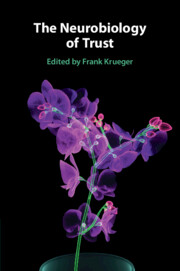23 results
Copyright page
-
- Book:
- The Neurobiology of Trust
- Published online:
- 09 December 2021
- Print publication:
- 16 December 2021, pp iv-iv
-
- Chapter
- Export citation
Part III - Neurocharacteristic Level of Trust
-
- Book:
- The Neurobiology of Trust
- Published online:
- 09 December 2021
- Print publication:
- 16 December 2021, pp 219-312
-
- Chapter
- Export citation
Chapter 14 - Trust and Psychopharmaca:
- from Part IV - Neuromolecular Level of Trust
-
-
- Book:
- The Neurobiology of Trust
- Published online:
- 09 December 2021
- Print publication:
- 16 December 2021, pp 338-368
-
- Chapter
- Export citation
Abbreviations
-
- Book:
- The Neurobiology of Trust
- Published online:
- 09 December 2021
- Print publication:
- 16 December 2021, pp xvi-xviii
-
- Chapter
- Export citation
Part IV - Neuromolecular Level of Trust
-
- Book:
- The Neurobiology of Trust
- Published online:
- 09 December 2021
- Print publication:
- 16 December 2021, pp 313-386
-
- Chapter
- Export citation
Dedication
-
- Book:
- The Neurobiology of Trust
- Published online:
- 09 December 2021
- Print publication:
- 16 December 2021, pp v-vi
-
- Chapter
- Export citation
Index
-
- Book:
- The Neurobiology of Trust
- Published online:
- 09 December 2021
- Print publication:
- 16 December 2021, pp 492-494
-
- Chapter
- Export citation
Tables
-
- Book:
- The Neurobiology of Trust
- Published online:
- 09 December 2021
- Print publication:
- 16 December 2021, pp xi-xi
-
- Chapter
- Export citation
Contributors
-
- Book:
- The Neurobiology of Trust
- Published online:
- 09 December 2021
- Print publication:
- 16 December 2021, pp xii-xv
-
- Chapter
- Export citation
Chapter 12 - Trust and Brain Dynamics
- from Part III - Neurocharacteristic Level of Trust
-
-
- Book:
- The Neurobiology of Trust
- Published online:
- 09 December 2021
- Print publication:
- 16 December 2021, pp 293-312
-
- Chapter
- Export citation
Part I - Fundamental Level of Trust
-
- Book:
- The Neurobiology of Trust
- Published online:
- 09 December 2021
- Print publication:
- 16 December 2021, pp 13-98
-
- Chapter
- Export citation
Contents
-
- Book:
- The Neurobiology of Trust
- Published online:
- 09 December 2021
- Print publication:
- 16 December 2021, pp vii-ix
-
- Chapter
- Export citation
Part V - Neuropathological Level of Trust
-
- Book:
- The Neurobiology of Trust
- Published online:
- 09 December 2021
- Print publication:
- 16 December 2021, pp 387-491
-
- Chapter
- Export citation
Part II - Neuropsychological Level of Trust
-
- Book:
- The Neurobiology of Trust
- Published online:
- 09 December 2021
- Print publication:
- 16 December 2021, pp 99-218
-
- Chapter
- Export citation
Figures
-
- Book:
- The Neurobiology of Trust
- Published online:
- 09 December 2021
- Print publication:
- 16 December 2021, pp x-x
-
- Chapter
- Export citation
Introduction
-
- Book:
- The Neurobiology of Trust
- Published online:
- 09 December 2021
- Print publication:
- 16 December 2021, pp 1-12
-
- Chapter
- Export citation

The Neurobiology of Trust
-
- Published online:
- 09 December 2021
- Print publication:
- 16 December 2021
Properties of the Cognitive Function Battery for the MIND Diet Intervention to Prevent Alzheimer’s Disease
-
- Journal:
- Journal of the International Neuropsychological Society / Volume 28 / Issue 8 / September 2022
- Published online by Cambridge University Press:
- 06 October 2021, pp. 790-797
-
- Article
- Export citation
Left rostrolateral prefrontal cortex lesions reduce suicidal ideation in penetrating traumatic brain injury
-
- Journal:
- CNS Spectrums / Volume 25 / Issue 1 / February 2020
- Published online by Cambridge University Press:
- 10 April 2019, pp. 24-31
-
- Article
- Export citation
Chapter 10 - Aggression, DRD1 polymorphism, and lesion location in penetrating traumatic brain injury
- from Section 3 - Neurobiology
-
-
- Book:
- Violence in Psychiatry
- Published online:
- 19 October 2021
- Print publication:
- 28 April 2016, pp 81-89
-
- Chapter
- Export citation



